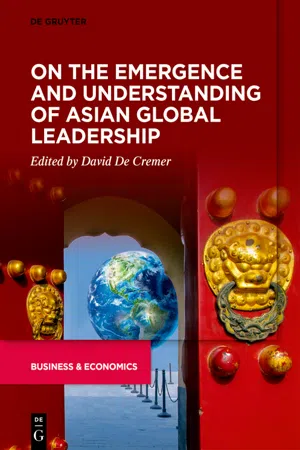
- 190 pages
- English
- ePUB (mobile friendly)
- Available on iOS & Android
On the Emergence and Understanding of Asian Global Leadership
About This Book
In the twenty-first century, it is necessary for Asia to step up and assume a larger leadership role on the global stage, commensurate with its economic weight and interests. Eighty-eight percent of the increase in the numbers of the middle class in the next five years will take place in Asia, underscoring the reality that global business and leadership will be colored in significant ways by Asian values, approaches and strategies. This book explores how this may impact our view and conceptual approach to the notion of global leadership.
The contributors to this collection explore and examine the concept of global Asian leadership and outcome implications at the societal, corporate and policy-making level. They argue that global leaders will increasingly focus on specific needs, values and strategies that are uniquely Asian, which emphasizes the reality that we most likely will have to redefine our notion of global leadership. This comprehensive study of the integration of Asian and global leadership will benefit those employed in the corporate, government and educational sectors as well as a broader audience with an interest in leadership, policy-making and economics.
"To truly understand Asia, one needs to grasp not only its cultural dimensions, but also the organizational and societal contexts which provide a training ground and unique challenges and opportunities for Asian leaders. In this book, leading scholars share the latest thinking and scientific research on exactly these topics. Highly recommended for both novices and seasoned executives and scholars!"
Donald L. Ferrin, Ph.D., Professor of Organisational Behaviour and Human Resources, Lee Kong Chian School of Business, Singapore Management University
"While Asia's rapid economic growth has caught the attention of the world, the study of the leadership engine behind the growth has been scarce. This book fills the void by assembling a coherent group of insightful articles to explore and explicate how Asian business leadership is different yet also similar to Western business leadership. The similarity resides in the meaning of leadership, that is, the capacity to influence others to achieve a common goal, whereas the difference manifests in the means or styles to exert such influence. With better and deeper understandings of Asian business leadership, this book offers invaluable wisdom to bridge the gap between the East and West for a more prosperous future of all mankind"
Philip M. Condit, Endowed Chair Professor in Business Administration, Editor-in-Chief of Management Insights and Incoming Editor-in-Chief of Management and Organization Review, Department of Management and Organization, Foster School of Business, University of Washington
Frequently asked questions
Information
Part I: Understanding Asian Leadership in a Global Setting
Chapter 1 An Asian-Centric View of Cross-Culture Leadership Research
Introduction
Existing Cross-Culture Leadership Frameworks
| Differences | Hofstede Model | GLOBE Model |
|---|---|---|
| Time period | 1967–1973 | 1994–1997 |
| Respondents | Managers and non-managers | Managers |
| Organizations surveyed | IBM and its subsidiaries | 951 organizations globally |
| Industries | Information technology | Financial services, food processing, telecommunications |
| Dimensions | Power distance, individualism vs. collectivism, uncertainty avoidance, masculinity vs. femininity, long-term orientation vs. short-term orientation, indulgence vs. restraint | Power distance, uncertainty avoidance, ... |
Table of contents
- Title Page
- Copyright
- Contents
- Advance Praise for On the Emergence and Understanding of Asian Global Leadership
- David De Cremer Introduction to the Emergence of Asian Global Leadership
- Part I: Understanding Asian Leadership in a Global Setting
- Part II: On the Challenges of Asian Leadership in a Global Setting
- Part III: Asian Global Leadership in Action